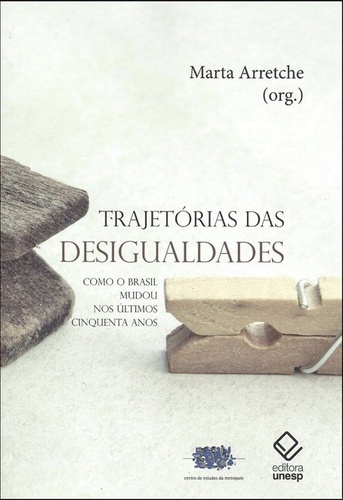Book release Paths of Inequality
Paths of Inequalities: How Brazil has changed in the last 50 years, Marta Arretche (Org.), Unesp Publ./CEM.
 In June 2015, the CEM launched the book “Paths of Inequalities: How Brazil has changed in the last 50 years,” by Marta Arretche (Org.), Unesp Publisher/CEM, 2015. The work is organized by CEM director and professor at the Department of Political Science – USP, Marta Arretche, and provides contributions to the social sciences concerning the connections between democracy, public policies, and inequality, presenting research on the history of inequality in Brazil over the past 50 years.
In June 2015, the CEM launched the book “Paths of Inequalities: How Brazil has changed in the last 50 years,” by Marta Arretche (Org.), Unesp Publisher/CEM, 2015. The work is organized by CEM director and professor at the Department of Political Science – USP, Marta Arretche, and provides contributions to the social sciences concerning the connections between democracy, public policies, and inequality, presenting research on the history of inequality in Brazil over the past 50 years.
Methodological and Statistical Annex
Part of the book “Paths of Inequalities: How Brazil has changed in the last 50 years” the Methodological and Statistical Annex, includes charts and figures, supporting materials, CEM Report and Syntax standardization. These Annex are available freely.
Download the files of methodological and Statistical Annex here
Special Features
Animations explain some aspects of research on inequalities
Animations explain some aspects of research on inequalities. CEM - Center for Metropolitan Studies and Ciência USP report on Brazilian inequality in the last 50 years, through animations that were produced from the conclusions of research and analyses of the census from 1960 to 2010 that resulted in the book “Paths of Inequalities: How Brazil has changed in the last 50 years,” edited by Marta Arretche.
The videos are available on YouTube
Special edition brochures CEM-Oxfam in Le Monde Diplomatique Brasil
“Increasingly Unequal?” (April 2016) This booklet (now in an English version), prepared by a partnership of the Center for Metropolitan Studies (CEPID-FAPESP/USP/CEBRAP), Le Monde Diplomatique Brasil and Oxfam Brazil, aims to help discussions on various dimensions of inequality, such as income, education, race, gender, urbanism and public safety. We hope this material can open new arenas for dialogue and strengthen civil society’s mobilization strategies. You can download the complete booklet with the set of articles in English language.
“Inequality in Motion” In January 2017, the CEM-Center for Metropolitan Studies, in partnership with Oxfam Brasil and Le Monde Diplomatique Brasil, published the special booklet, “Inequality in Motion.” The special edition includes articles that address the challenges that the new mayors of the Brazilian municipalities will face this year.
News on the book
“The trajectory of inequalities in Brazil,” by Marta Arretche
Director of the Center for Metropolitan Studies and professor of political science at USP, Marta Arretche speaks to UM BRAZIL about the trajectory of Brazilian inequalities in recent decades. In the conversation with Humberto Dantas, she analyzes the extent to which public policies have reduced the concentration of income, the importance of the minimum wage in this process, the impact of public services on the household budget, and the disparity of resources between the municipalities responsible for these services.
Teaser: “Concept of inequality is broad and abstract.”
Click here to watch the interview
International seminar addressed the research presented in the book
The challenges modern Brazil faces, in particular the ongoing crisis of governance and a deep economic recession, raise important questions about the country’s capacity to preserve impressive gains it made in recent decades to reduce historically high levels of social, economic, and political inequalities. This is the context of a daylong seminar the Brazil Institute of the Wilson Center promoted in partnership with the University of São Paulo's Center for Metropolitan Studies and the São Paulo Science Foundation (FAPESP). To know more about the event, please click here.
Webcast recap click here and on Youtube: part 1, part 2, part 3 e part 4.
 Inequality in Brazil is a topic of debate in the USA, 3/4/2016
Inequality in Brazil is a topic of debate in the USA, 3/4/2016
Researchers from the Center for Metropolitan Studies (CEM) traveled to Washington, DC, in early 2016 to present research from the book “Paths of Inequalities: How Brazil has changed in the last fifty years” and discuss them with North American scholars. The work stands out for investigating inequality beyond the issue of income. The meeting took place at the Wilson Center in February 2016.
Click here to watch a special feature about the event (portuguese content only)
 Recording by UNIVESP TV of the seminar that launched the book “Paths of Inequalities,” which took place on June 2, 2015, at FFLCH/University of São Paulo. “Encontros - Trajetórias das desigualdades” (click here to watch the seminar)
Recording by UNIVESP TV of the seminar that launched the book “Paths of Inequalities,” which took place on June 2, 2015, at FFLCH/University of São Paulo. “Encontros - Trajetórias das desigualdades” (click here to watch the seminar)
 Interview with Marta Arretche on several aspects covered by the book, “Paths of Inequalities.” Click here. (Portuguese content only)
Interview with Marta Arretche on several aspects covered by the book, “Paths of Inequalities.” Click here. (Portuguese content only)
For more news about this publication, please access the “CEM in the Media” section of this website.
Press release
About the book
This work challenges the classic thesis that Brazil has experienced an “unacceptable stability” in inequality. In 14 essays, which address education and income, public policies, demography, labor market, and political participation, the book reveals that inequalities have actually been significantly reduced in recent decades, although the country remains among the most unequal in the planet. The essays also make it clear that this process has been closely associated with political decisions, from which it depends upon for its continuity.
The analyzed period is one of the most distinguished periods, economically and politically speaking, ever experienced in the country: the 50 years between 1960 and 2010. The analyses are based on data from six Demographic Census conducted by IBGE during this time interval. The articles evoke images that reflect an accelerated transition from a rural and homogeneously impoverished country, where only 20% of youth up to 15 years old have finished four years of basic education, to an urban country with almost universal access to basic education, with a significant expansion in the scope of public services, and with an increase in 11 years in the average life expectancy of its population.
However, women and people of color did not have the same success. They entered the labor market on a mass-scale, but in 2010, just as it happened with Brazilians in the second group, their wages were lower than those of white men, even when they had the same educational level. People of color have advanced even less than women have, which are distributed across all social classes. While there has been an increase in the admission of people of color in universities in recent decades, in 2010 white people were still 75% of the college population and generally enrolled in more prestigious careers. Consequently, the reduction of inequalities for people of color within the school system remained limited to the educational level where access had become universal, that is, basic education.
This contrast reinforces the editor’s conclusions: “The long-term trajectory of inequalities in Brazil reveals that there is no determinism — economic or political — in the process. Policies matter! More than that: changes in inequality patterns call for policies across long periods of time.”







